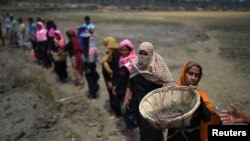A report by the Association of Southeast Asian Nations (ASEAN) on Myanmar's readiness to repatriate Muslim Rohingya who fled to neighboring Bangladesh paints a mostly positive picture of the country's efforts.
But rights groups say the report glosses over still-dangerous realities in western Myanmar's Rakhine State, where the U.N. accuses the country's security forces of orchestrating a violent campaign of ethnic cleansing in late 2017 that drove some 700,000 Rohingya across the border.
The rights advocates are urging the regional bloc to rethink its approach and focus on the root causes of the crisis at its leader summit in Bangkok this weekend.
At its last leader summit in November, ASEAN called on its disaster management unit, the AHA Center, to assess Myanmar's readiness to resettle the refugees and how the center could help.
Bangladesh and Myanmar agreed in November 2017 to start repatriating volunteer refugees within two months. But hardly any of them have taken up the offer, insisting that Myanmar first ensure their safety and rights to land, freedom of movement and citizenship.
The U.N. has repeatedly said that conditions are "not conducive" for the Rohingya's return.
The yet-to-be-released report, or "preliminary needs assessment," obtained by VOA, concludes that the Myanmar government "has made substantial effort in terms of developing procedures, processes and systems, as well as in building facilities to ensure a smooth and orderly repatriation process."
It says communal relations between the Buddhist Rakhine and those Rohingya who stayed behind "while stable, is fragile," kept in check only by an "invisible line that separates them."
With the right technical help, it adds, Myanmar could repatriate 500,000 Rohingya in two years.
But in a statement, Human Rights Watch rebuked the bloc over the report for all but ignoring the alleged spree of state-sponsored rape, murder and arson that drove the Rohingya out, not consulting with the refugees themselves, and avoiding the very term "Rohingya," which the Myanmar government rejects.
Amnesty International told the French news agency, which first reported on the assessment, it was "astonished" that it downplayed the military's alleged crimes, the continued segregation of Rohingya in western Myanmar displaced by earlier bouts of communal violence, and ongoing fighting there between the military and Rakhine rebels.
"From the grassroots level, a lot of the Rohingya feel ...that the situation on the ground is not safe and that the conditions for repatriation will not be met. So there is a disconnect there between the sort of overoptimistic representation in the report versus what the Rohingya on the ground actually feel," Saqib Sheikh, a program director with the Rohingya Project, which aids displaced Rohingya, told VOA.
Calls to the AHA Center's head office in Jakarta, and an emailed request for comment, went unanswered Friday.
But the center's executive director, Adelina Kamal, defended the report in an interview with Channel NewsAsia earlier this month.
Kamal said the Emergency Response and Assessment Team (ERAT) the center sent to western Myanmar had a very specific mission to look for ways the bloc could help Myanmar improve its repatriation plan.
"ASEAN's ERAT has specific areas of expertise — disaster management," she said.
"And so we have been requested by Myanmar to provide assessment for them — it's very focused and we cannot go beyond our mandate."
The "preliminary needs assessment" says it was beyond that mandate to judge whether broader conditions were conducive for repatriation. It adds that a "comprehensive needs assessment" that could answer that would follow once the first few thousand refugees start to return, or after.
"The main concern there is, that may be too late," said Sheikh
"Unless you can guarantee that not just security, but also ... the more fundamental issues of citizenship and due human rights to the Rohingya, whether they're going to be met — if that's still in a cloud, then it wouldn't really make sense to begin a repatriation process," he said.
The report says Rohingya technically have a path to citizenship via Myanmar's 1982 Citizenship Act.
But it's not that simple, said Phil Robertson, Human Rights Watch's deputy Asia director.
"Every reading I've seen of the 1982 Citizenship Act indicates very clearly that the vast, vast majority of Rohingya would be excluded, that they would not be found to be citizens and that they would be officially rendered stateless persons since they would be neither of Bangladesh nor Burma," he told VOA, using another term for Myanmar.
"You can say almost anything is technically possible. The reality is that there's no political will within the Myanmar government to extend citizenship to the Rohingya."












